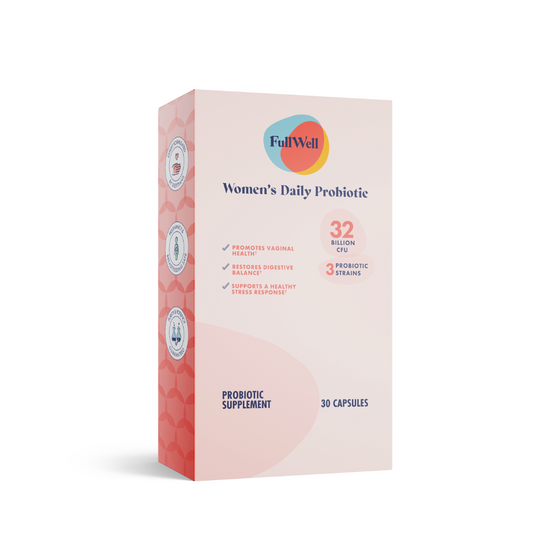How to Choose the Best Probiotic for Women
TL;DR

With so many probiotic options available, finding the right one can feel overwhelming. By focusing on a few key factors, you can simplify the process and select a supplement that’s both effective and tailored to your needs.
We’ll walk you through five essential considerations to help you make an informed decision and choose a probiotic that supports your health.
If you missed part 1 of our probiotic series, start here to discover the many benefits probiotics offer women. Once you're familiar with the perks, let’s dive into how to choose the perfect probiotic.
5 Considerations for choosing the best probiotic for women
1. Choose research-backed strains that meet your needs
Not all probiotics are created equal. The effectiveness of one depends on the specific strains and the precise number of CFUs (colony-forming units). We’ll dive into this further in consideration number 2.
It’s important to choose strains that have been carefully researched for your specific health goals for maximum efficacy.
For example, if you’re looking for a probiotic that meets the unique needs of women and has benefits beyond just digestive health, you may choose the following strains:
L. rhamnosus (HN001)™ + L. acidophilus (La-14) ® to support vaginal health
The vaginal microbiome, mainly composed of Lactobacillus bacteria, helps maintain a healthy environment, highlighting its importance to overall well-being (1).
A healthy vaginal microbiome supports not only pregnancy (2) but also helps support overall vaginal health, helping to maintain a healthy vaginal pH and microbial population (1, 3, 4, 5).
L. rhamnosus (HN001)™ + L. paracasei (Lpc-37) ® for supporting a healthy stress response and positive postpartum mood
Managing stress is vital for fertility, as prolonged stress can disrupt hormones and interfere with everything from ovulation to implantation.
Some probiotic strains, like L. paracasei (Lpc-37) ®, have been shown to promote a healthy stress response and support physiological and psychological stress, enhancing general mental well-being (6). Its effects can vary depending on factors like your stress levels and gender, with one particular study highlighting that L. paracasei (Lpc-37) ® reduced perceived stress in women but not men. (6).
Studies also show that L. rhamnosus (HN001)™ helps support postpartum mood compared with placebo (7). Although the exact mechanisms behind these positive effects are still being explored, the initial findings are promising (6).
Consulting with a healthcare provider can also help ensure that you’re choosing the right strains for your individual health concerns, whether you’re focused on vaginal health, digestive support, stress support, or overall well-being.
2. Higher CFU count does not mean better probiotics
CFU stands for Colony Forming Units, which measures the number of viable (living and able to grow) microorganisms in a probiotic supplement. For example, a supplement labeled with 32 billion CFU means it contains 32 billion organisms per capsule.
The effectiveness of probiotics depends more on the quality and the specific strains used rather than the CFU count alone. Higher CFU counts are not necessarily indicative of a better product. Factors like the strain’s effectiveness and how well it survives in the digestive tract are also important.
The real power of probiotics comes from choosing the right strains that target your specific health needs in the right count. So, instead of focusing on CFU count alone, it's more important to choose quality strains that deliver the benefits you're looking for (8).
3. Not all probiotics need to be in acid-resistant capsules
Many probiotic strains, such as L. acidophilus (La-14) ®, L. paracasei (Lpc-37) ® (9, 10) and L. rhamnosus (HN001)™ (11, 12), are naturally strong and can survive the stomach's acidic environment without special coatings or acid-resistant capsules.
Studies show that these probiotics can establish themselves in the intestines and vagina (5, 13). This means they can survive the digestive process and stay in these areas where they’re needed to have a positive effect.
Keep in mind, not all probiotic strains are naturally resilient enough to survive the stomach's acidic environment without special coatings or acid-resistant capsules. It's important to check for research on specific strains to ensure they can withstand digestion and still provide their intended benefits.
4. Not all probiotics need to be refrigerated
Probiotics can be safely stored in various ways, and no single method is universally better—it all depends on the specific strains. Many probiotics don’t need refrigeration, as they’re often freeze-dried or specially packed to stay stable at room temperature. However, proper storage is key to maintaining their potency and ensuring they stay effective over time.
Look for companies that create probiotics that:
- Tell you how to safely store your probiotics. For example, we recommend keeping our Women’s Daily Probiotic in a cool, dry place, away from sunlight, and below 68°F (20°C) to preserve its shelf life and potency if it's shelf-stable.
- Are manufactured in tightly controlled environments that follow manufacturing guidelines (called Good Manufacturing Practices, or GMP).
- Choose packaging that's designed with care, such as pharma-grade blister packs that shield your probiotics from moisture and light, ensuring maximum protection and potency.
- Prioritize maintaining optimal temperatures at every stage—from manufacturing and fulfillment to final delivery—since temperature fluctuations, especially in warmer months, can compromise the quality and potency of your probiotics along the way.
5. The importance of third-party testing
Ensure the probiotic has been tested by an independent third party to ensure safety and quality. Third-party testing means that an independent organization tests a product to verify its quality, safety, and effectiveness. This is especially important for those trying to conceive or pregnant, as it ensures that what's on the label matches what’s actually in the product, providing peace of mind that you’re getting safe and reliable probiotics for both you and your baby.
Look for things like:
- Testing for heavy metals, including arsenic and lead.
- Glyphosate and bisphenol A (BPA). Glyphosate, a herbicide, and BPA, a chemical used in plastics, can be harmful if consumed in significant amounts. Third-party testing ensures that products are free from these contaminants or contain them at safe levels.
- Adherence to Prop 65 Standards, which meets California's stringent safety guidelines for consumer products, protecting you from harmful chemicals.
- Free from the top 8 major allergens (milk, eggs, peanuts, tree nuts, fish, shellfish, soy and gluten), if you need to avoid them for personal reasons.
- Accurate information on whether the doses of the strains (CFU’s) on the label made it into the final product.
Struggling to narrow down your probiotic choices? We’re here to help!
FullWell’s Women’s Daily Probiotic
FullWell’s Founder and Registered Dietitian, Ayla, formulated the only comprehensive probiotic supplement with meticulously matched strains studied for women’s unique needs throughout their reproductive health journey. Our Women’s Daily Probiotic combines 32 billion colony-forming units (CFU) of L. acidophilus (La-14) ®, L. rhamnosus (HN001)™ and L. paracasei (Lpc-37) ®, a combination that’s ideal for digestive health, vaginal health, and a healthy stress response.
As with all of our products, we always uphold the same meticulous attention to our manufacturing processes and testing protocols as we do to our formulations. What that means is that our products undergo rigorous double testing, first by the manufacturer for strain quality, and then again by us through a third party, to ensure that what’s on the label is precisely what you’re getting—nothing more, nothing less. Plus, we proudly offer our test results for full transparency, no questions asked.
And if you’re wondering if it’s safe for pregnancy and breastfeeding, it is! The strains in our formula are supported by a long history of safe use with no serious adverse effects reported in clinical studies across diverse populations, including pregnant and breastfeeding women.


